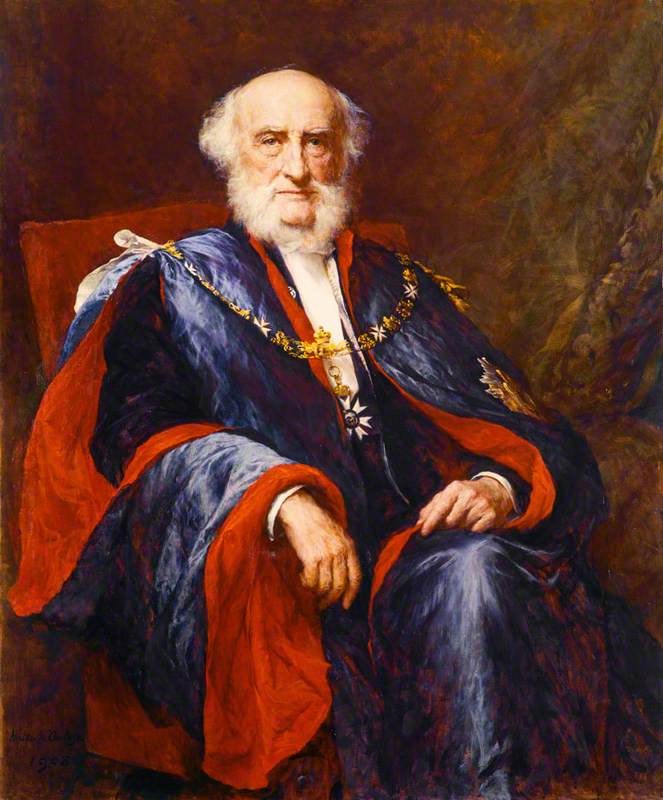Sir Donald Currie and his Cup

That is surprising considering the aggressive amateurism of the 1890s, at a time when rugby league was being born of men who wanted a little bit of monetary compensation for taking time off work to play rugby.
Donald Currie was born in Glasgow on 17 September 1825, the third son of a Greenock barber, James Currie, and his wife Elizabeth (née Martin). His family moved to Belfast in Northern Ireland when he was an infant. There his father is recorded as "Hairdresser and Perfumer", apparently successfully as the father of six sons and four daughters. Donald was in later life made a freeman of the city of Belfast.

Ships fascinated young Donald and he went down to Liverpool to join his brother James in the employ of the Cunard Line which was then new and a small affair. Then he began to move around in the shipping world, going up rapidly till he formed his own steamship company in 1862. It was called Donald Currie and Co, initially involved in the North Sea and Atlantic shipping.
In 1872, in competition with the Union Line, Donald Currie introduced his steamers to the Cape Town run as the Castle Line to be the mail-carrying ships. Later, on 8 March 1900, he joined with the Union Line to form the famous Union-Castle Line. The last mail ship was the Southampton Castle which sailed from Cape Town to Southampton in 1977.
Currie was knighted by Queen Victoria in 1881, taking Thorough as his motto. The knighthood was not just because he was rich. His South African connection made him useful to Britain, for example in the negotiations with President Brand in cutting a bit out of the land formed by the confluence of the Vaal and the Orange and giving it to Britain. The land, cut from the Orange Free State, contained Kimberley and its big diamond mine. He helped the Transvaal delegations when they came to Britain in the 1870s to protest against annexation, and the Boers got the Transvaal back – for a while. And in the process, Currie's own wealth increased.
In fact, South Africa's gold and diamonds added more to his great wealth than shipping.
In 1887 Sir Donald Currie came for the first time to South Africa
When the first cricket team came to South Africa the following year, Sir Donald gave the captain, Major Warton, a cup to present to the team which played best against the tourists with the intention that it become a floating trophy for Interprovincial competition. The team that received the cricket Currie Cup was Griqualand West. That is not surprising as that is where there were diamonds and men such as CJ Rhodes and Barney Barnato - the source of Currie's wealth, in which he had had an early say.
That was the first of five Currie Cups which he sent to South Africa. There were cups for cricket, rugby, soccer, swimming and waterpolo. The next Currie Cup after cricket was the rugby cup.
On 19 June 1891, the Dunottar Castle left Southampton with precious cargo - the touring British team, which called itself the English Team because England did the administration for the team, and the Currie Cup with the same conditions as had applied to the cricket cup.
* Article continues below video!
Currie travelled from London to Southampton and during a farewell luncheon on board the Dunottar Castle he handed the Cup to the captain, WE Maclagan, also a Scot. The whole thing was done with great publicity as Currie sought to steal the march on the Union Line. The Cup was a sponsor's tool.
The Currie Cup became the Holy Grail of South African rugby, especially during the years when few Tests were played. It was valued at £40. £40 in 1890 is reckoned to be worth nearly £5 000 today.
Never in the history of sport have so many played with so much passion over so many years for so little! It is a humble cup, the Currie Cup. The top is gold-plated silver, the base wood, and was put on display in Burmeister's Jewellers in Adderley Street, Cape Town, upon its arrival. Nowadays it is insured for R100 000, though, of course, it is impossible to put a monetary value on it. It is priceless.
No team beat the 1891 tourists, but they reckoned that Griqualand West had played best against them, perhaps a diplomatic decision as Rhodes had guaranteed the financial success of the 1891 tour.
Griquas were loath to part with it to fulfil Currie's conditions that it be used for Interprovincial competition but eventually they gave in. Teams since then have also been reluctant to part with the Currie Cup.
Sir Donald Currie, GCMG, who made greater wealth from gold and diamonds than from shipping, was a member of Parliament for West Perthshire. He died at the Manor House in Sidmouth, Devon, on 13 April 1909. A special memorial service was held in St Paul's Cathedral to honour him. King Edward VII and the Prince of Wales sent messages of condolence. His body was taken back to Scotland, where he was buried, not in a posh cathedral, but outside a small church outside the small village of Fortingall near Pitlochry in the highlands of Scotland. The grave is under a yew tree which is thought to be the oldest living thing in Europe, possibly over five thousand years old. Currie had built the village the year before the 1891 tour at a spot where the Romans had once camped, thought to be the birthplace of Pontius Pilate.
Currie's steamship company built two famous Cape Town hotels - the Grand in Strand Street which was demolished in 1973, and the majestic Mount Nelson in the Gardens. The Centre for the Book and the University of Cape Town both benefited from the generosity of Currie and Willem Hiddingh. The year after his death Currie's daughters donated £25 000 to the University of the Cape of Good Hope, a huge amount of money in those days.
Currie was survived by his wife Margaret (née Miller) and three daughters – Lady Merrielees, Mrs PA Molteno and Mrs GA Wisely. Elizabeth was married to a South African, Percy Molteno, lawyer, businessman, politician and philanthropist who devoted much of his time to improving the lot of all South Africans, a proponent of a universal franchise long before 1994. He both opposed the Anglo-Boer War, as had his father-in-law, and black exclusion from Union of South Africa franchise. He supported the young ANC.
Wealthy need not mean nasty!
NB
OBE: Order of the British Empire
MBE: Member of the British Empire
CMG: Companion in the Order
KCMG: Knight Commander of the Order of St Michael and St George
GCMG: Grand Cross of the Order of St Michael and St George
A less reverent version
CBE: Covers Bloody Everything
OBE: Others' Bloody Efforts
MBE: My Bloody Efforts
CMG: Call Me God
KCMG: Kindly Call Me God
GCMG: God Calls Me God
By Paul Dobson
@rugby365com

